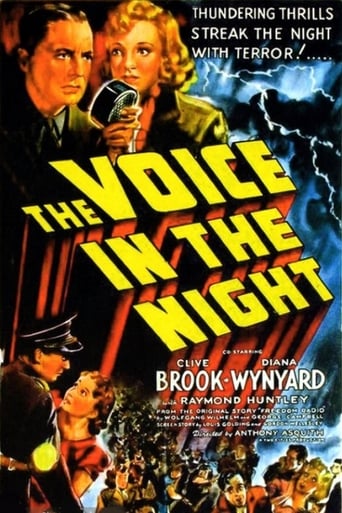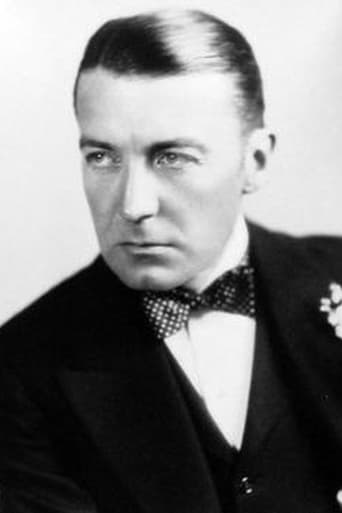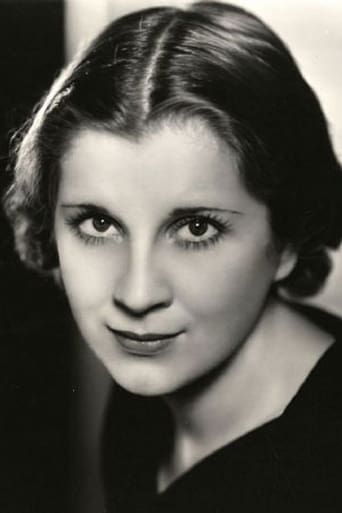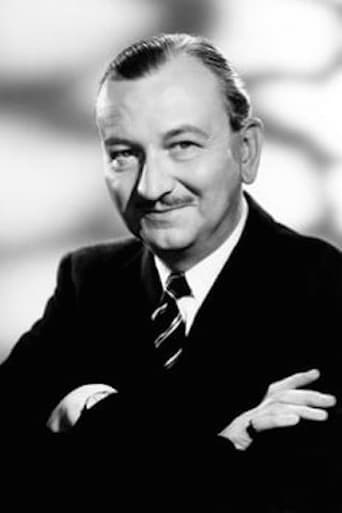Freedom Radio (1941)
Hitler's doctor is gradually realising that the Nazi regime isn't as good as it pretends to be when his friends start to "disappear" into the camps. His wife is courted by the party and accepts a political post in Berlin. Meanwhile Dr Karl decides to try to do something to counteract the Nazi propaganda and with the help of an engineer and a few friends he sets up the Freedom Radio to counteract the Nazi propaganda.
Watch Trailer
Free Trial Channels
Cast


Reviews
Instead, you get a movie that's enjoyable enough, but leaves you feeling like it could have been much, much more.
A movie that not only functions as a solid scarefest but a razor-sharp satire.
The film's masterful storytelling did its job. The message was clear. No need to overdo.
There are moments that feel comical, some horrific, and some downright inspiring but the tonal shifts hardly matter as the end results come to a film that's perfect for this time.
Recently Film Four in the UK has been screening vintage British films from the 30s and 40s and this entry directed by Puffin Asquith demonstrates just how superior his early work was compared with that of Carol Reed. Reed in fact tackled a similar subject to this the year previously but his Night Train To Munich is light years away from Freedom Radio which is never risible. Okay, they had ten writers on the project and a leading man and leading lady who today would seem mannered in the extreme but they were surrounded by excellent supporting players such as Raymond Huntley, Ronald Squire, Martita Hunt, Bernard Miles and Katie Johnson, so memorable some fifteen years later in the original The Ladykillers. Reed's screenplay had nothing, for example, to compare with Ronald Squire's droll comeback when asked how he enjoyed his recent trip to America 'I didn't go to America, I went to New York'. Clive Brook manages to personify decency and the outrage felt by ordinary Germans at what they observed going on around them - again Puffin employs a crisp economical montage involving boutonnieres that disappear one by one as do their owners. A fine effort.
This film is currently turning up regularly on Film4 in the UK. It's still worth watching for a flavour of the sort of stuff bring shown during the second world war. Not too propagandist - in fact most of the bad things shown proved to be fact when the war was won.Incidentally, one reviewer seems to think that the doctor was German - he was in fact Austrian (like Mr. Hitler!).I didn't realise that the action was taking place in Austria as one reviewer tells us.Like others I had no problem with the actors not trying to speak with German accents. I prefer this to half the cast speaking the Queen's (or should it be King's) English and all the 'baddies' speaking with 'evil' German accents.At the date of this comment the film is appearing on Film4.
The movie is set in Austria at the time of the Anschluss-its merger with Nazi Germany .The main character is a well respected and highly placed medical man ,Dr Karl Roder whose patients include the world's most famous ex- housepainter ,the testicularly challenged Herr Hitler himself .Roder detests the Nazi party but his actress wife Irena is less politically aware and is flattered to be appointed as a party functionary (Director of Pagenntry).Roder sees his anti-Nazi friends disappear and one ,a priest ,is murdered before his eyes .(The theme of anti-Nazi German clerics was explored in the contemporaneous movie Pastor Hall which is worth watching as well).He resolves to strike back by opening a propagandist and wholly illegal radio station -Radio Freedom with the aid of a young engineer whose fiancé has been abused by the Nazis The movie is crisply directed by the ever dependable Anthony Asquith and it makes good use of authentic period footage of Nazi rallies and parades.The cast make no attempt whatsoever to speak in German or Austrain accents and the clipped tones of the West end stage of the time are heard from leading players such as Clive Brook and Diana Wyngarde as Roder and Irena .Raymond Huntley is an impressive villain and the cast includes such stalwart supporting players as Martita Hunt ,playing a snooping neighbour,Joan Hickson and the Hammer studios luminary to be .Clifford Evans ,and Bernard Miles The movie does conjure up the sense of suspicion ,fear and distrust of the era and serves as an effective counter to the pacifist nonsense of such trash as John Ford's celluloid garbage "The World Moves On" Well made and worthy but not top drawer
Dr Karl Roder is a German doctor who enjoys his practice and comfortable life in Germany in the late 1930's. However as the months pass he notices the Gestapo rising to power in the country, with many of his professional friends being 'disappeared' for the slightest of reasons. Eventually his student meeting of doctors is broken up as part of the new rules on gatherings. His first experience of the new regime firsthand is when he sees a minister decrying the ruling power only to be removed from the pulpit and later be reported dead in a twisted and deceitful report. Frustrated by what he sees happening, Roder turns to a radio building friend for help and soon he has made the first broadcast of Freedom Radio but the Gestapo are soon trying to find him and shut him down.When screened on television this film still bares the certificate from the BBFC that rates it as suitable for 'adult' audiences meaning that this is actually part of the film. At the time I'm not sure why they felt this was appropriate for that rating but they did, certainly watching it didn't really give me any idea as to what was so bad about the content here. The film is set within Germany and shows some elements of the community (albeit Germans with good clean English accents as opposed to the Gestapo who have a forced accent!) that were willing to stand up and decry the actions of the Government. Maybe this is why it was rated A for adults, because it is easier to see a whole country as the enemy during a war rather than accept that the people are essentially just people. Anyway, aside from this bombshell (!) there is nothing really to the film that justifies seeing it and explains why it is so rarely seen these days.The plot goes down the roads of a standard type of thriller but it lacks any real thrills and the story is told without much in the way of excitement. The use of footage of Hitler himself makes the film slightly more interesting but the main narrative is lacking a real bite to keep me interesting. Looking abck now we all know the atrocities that were carried out in the name of Germany so the vague hinting about disappearing scientists etc is hardly shocking or informative, but maybe at the time it had audiences on the edge of their seat with revelations about concentration camps, but my god the realities of the places is much worse that what this film can depict. The cast are pretty solid but none of them really make any impression. Brook doesn't prove himself as leading man material in a performance that is fairly stilted and stiff. The support cast are pretty good with some emotional performances but I can't remember any of their names.Overall an interesting film in terms of the 'different' (at the time) things it does in regards mentioning camps, showing a German resistance and showing Hitler but in terms of narrative it is pretty dull, lacking a real tension. The shock effect is also gone as we are much more aware of the true horror than we were in 1941, this leaves very little for the modern viewer hence it being pretty unknown nowadays.








